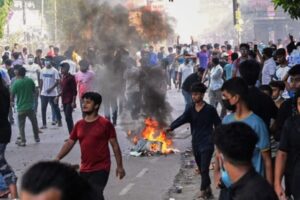Organized crime shifts focus on electronic scams & the threat to the financial systems near your grocery cash register
Brussels, Berlin, Bratislava, (23/5 – 25/23.39).
What does a murder, corruption, organized crime and QR fraud has in common? Technology and the threat to the credibility of systems of governance. Organized crime flourishes with the loopholes, intentional or accidental set up by governments. One of such case is the role of Michal Suchoba, super grass to the government and in hiding in Abu Dhabi, his associates Jozef Brhel, Martin Bahleda, and many others currently investigated by the Special prosecutor’s court in Slovakia.
Suchoba, a 49-year ex-employee of the Finance ministry, is closer investigated by authorities for his role in a QR fraud in Asia and Europe that could trigger some question about how safe our financial systems are withstanding criminal syndicates. Media reported that Suchoba was in custody since mid-February 2021 and turned state witness to negotiate a lighter sentence.
Michal Suchoba role is not merely a repenting criminal. He and his cabal of criminal enterprise created one of the most widespread fraudulent systems in Europe in use in Slovakia, Austria and the Serb republic possibly reaching across the Atlantic. A gargantuan task lies ahead for law enforces that is hardly understood by experts.
Michal Suchoba path from tech entrepreneur to convicted criminal and organized crime is going back to 2001. Slovakia moves towards democracy. The European Union found the young country being an opportunity to change the lives of millions of Slovaks. EU funding entered Slovakia. Money awash, the spirit of the moment was great. Enterprises shoot up, businesses started to create a modern economy.
But the EU officials did not encounter the vast criminal networks and enterprises in place. A system of oligarchs rooted in the communist heritage of networks, criminal enterprise that took advantage of the weak EU system of controls in place.
In 2015, the U.S. State Department identified Slovakia as a “jurisdiction of primary concern” in its International Narcotics Control Strategy Report. The country was described as having “a high level of domestic and foreign organized crime, mainly originating from eastern and southeastern Europe.”, the OCCRP wrote.
The climate created the world of Marian Kočner, Jozef Brhel, corruption at all levels and set Michal Suchoba and his cabal on the path of criminal riches eventually leading to the tragic murders of Ján Kuciak and his bride. Judges, police officers, members of the military, tax officials, politicians were part of a lateral and horizontal structure of fraud, greed, and power.
2001: The Siemens, IBM, Hewlett-Packard & QBSW: Suchoba’s first “kill”
Particularly the finance ministry underwent reforms and rapid changes. The government at the time sought out IT giants like Siemens, IBM, and the giant Hewlett-Packard. By 2001 the companies were invited to bid for Information Systems to reform the Slovak tax processes. Siemens in particularly held a strong background with working with the Slovak ministry of justice in creating technical platform-based systems.
It lost the tender to Hewlett-Packard, not once but five times according to public reporting by Slovak media. After the failed fourth 2001 bid, the head of Siemens Slovakia, Petr Parnoy a seasoned industry veteran, cried foul. Parnoy suggested that QBSW a subcontractor appointed by Hewlett-Packard was in fact owned by Michal Suchoba.
Suchoba denied the obvious conflict of interest, and sued Parnoy for defamation. In 2003 the case against Siemens was thrown out. But the question about corruption never vanished or was proven and like cancer, Suchoba, Jozef Brhel, Vilagi, Marian Kočner and Broeder grown in power and influence buying politicians, the police and legislators.
Slovakia drifted towards a mafia-state with the Russian influence growing, bombing an ammunition dump at will. By 2018 the rule of democracy and law was dead. A return of the pro-Russian SMER party to take power in Slovakia, ironically named closely like Stalin’s SMERSH, the Soviet counterintelligence unit under Stalin is in the making.
Under former prime minister Fico, SMER was packed with cronies, former models linked to the Italian mafia and local oligarchs that run prostitution, nightclub security rackets, police corruption at every level, judges and journalists spying for organized crime. Many set up a second home in the UAE. Michael Suchoba was one of them.
Robert Fico and his former minister of interior were arrested early 2022. And here is were the story of Michael Suchoba and Marian Kočner cross.
According to David Lindtner, a lawyer representing Fico and Kaliňák, who was quoted by Politico, the charges against his clients relate to acts they allegedly committed as Cabinet members between 2012 and 2018, when SMER anchored successive ruling coalitions.
The two men supposedly used classified tax files to wage smear campaigns against political rivals, including former President Andrej Kiska and Boris Kollár, currently Slovakia’s speaker of parliament. Marian Kočner used Suchoba to get access to the classified tax files. The killing of Ján Kuciak and his bride, Martina Kušnírová laid bare the connection to Suchoba crime association.
The indictment alleges that Fico was the head of a “criminal organization” that also included former police chief Tibor Gašpár, as well as Slovak oligarch Norbert Bodor. Bodor and Gašpár are said to reside in the UAE as well.
2018: A Murder that changed Slovakia forever: Suchoba and Marian Kočner
2018 changed all of that. Political observers of Slovakia pointed out that the assassination of Ján Kuciak and his bride, Martina Kušnírová was the beginning of the end of the new reign of terror, the “mafiazation” of the Slovak state. After a public outcry over the brutal assassination the reign of Robert Fico and his cabal of cronies collapsed. Amazingly the key suspect of planning the killing secured an overturn of the conviction but despite the Slovak state has charged Marian Kočner with the crimes of organizing a criminal enterprise and the attempted murders on three judges who stood in the way of his criminal power and ambitions.
One plot was straight out of a mafia style operation repeating the assassination of the much-respected Mafia judge Falcone. Marian Kočner stands accused to plan the car bombing of a special prosecutor and his young family at his home. Ján Kuciak became a softer target.
During the investigations with support of Europol and technical experts from cooperating law enforcement agencies, which according to the Washington Post included the FBI and Britain’s Scotland Yard, the links between Michal Suchoba and Marian Kočner emerged. Suchoba at the time in trouble with a shortage of 4.2 million euros was in the cross hairs of a tax investigation. He turned to Marian Kočner who recorded the meeting with Michal Suchoba.
Whereas Suchoba was not implicated in the murder investigation of the young journalist couple, he become focus of separate investigation involving the bribing of František Imrecze, the former head of the Financial Administration. Suchoba’s business partner included the well-known oligarch, Jozef Brhel.
Ironically, the assassination of Ján Kuciak and his bride, Martina Kušnírová didn’t put the fear into society. On the contrary, it toppled the corrupt administration of Robert Fico, exposed the crimes against the people of Slovakia and unified the European police forces in an unprecedented way unseen in Slovakia and Europe. If anything, like the Russian invasion of the Ukraine, the murder of Ján and Martina now a documentary released on 1 May this year unified Europe, energized Slovakians of all walks of life, and triggered at least 24 different investigations and court procedures against criminals, politicians, and corrupt police officials.
“A brilliant little plot”, the rise of the machines, Suchoba style
Many criminal gang members considered Marian Kočner as a “mad man”, “crazy”, “power-hungry manic”. He represents the older generation of gangster we find in Chicago in the 30’s. In fact, the Italian ‘Ndrangheta crime syndicate hate publicity. It operates in the shadows. Sources said, ‘the Ndrangheta has a privileged position on its criminal trade of drug and weapon smuggling, prostitution, extortion and so forth. It considers Kočner as a threat to its businesses threatening the organization.’
Michael Suchoba saw himself as the Slovak version of Jeff Brazos. Flamboyant in his advertising and self-promoting he lived in a top address in Bratislava and now lives in the UAE where Suchoba was arrested early February 2021. According to his social media profiles Suchoba is since June 2001 the “partner” of ALLEXIS in Slovakia and founder of MILLER Investments s.r.o in Slovakia.
It is unclear if Suchoba was employed by the Slovak Treasury in the Ministry of Finance. According to some media publications he oversaw contracts.
The allegations of insider trading made by Siemens now gets a different angle. The dates are odd because by September 2001 the Financial Administration enters in direct contract awards talks with Hewlett-Packard. At the same time a subcontractor with the bizarre name QBSW gets appointed as a sub to the IT giant.
A week later, Suchoba files defamation charges against Petr Parnoy, Siemens country manager. Suchoba now on fast track to success.
With his political connection to František Imrecze, the head of Financial Administration Michal Suchoba secures a lucrative 48-million-euro business creating a mandatory system of electronic payments for businesses, government and basically everyone regardless of young or old. Experts argue the loss to the public in Slovakia, the government and the European Union is maybe higher.
Suchoba described his criminal network as a “brilliant, little plot” to contemporaries. Virtually undetectable to tax authorities, to businesses, the individuals, or police according to IT experts.
It involved “eKasa”, or electronic-cash registry, to replace the old, manual cash machine. By 2019 Michal Suchoba convinced his Financial administration contacts, among them the IT business manager Milan Grega, and the head of the administration František Imrecze to push legislation to force every business to install ‘eKasa’ by May 2019. Despite the well documented vulnerabilities of the eKasa system to degrade the encryption the Slovak government has until today not replaced the flawed system.
The question to pose is the extend of Michal Suchoba attempting to defraud the Slovak state. It is yet to be established what is the extent of the fraud purported by Suchoba and his collaborators. And if the depositions are attempts to divert the attention of Slovak, European and Asian investigators.
Michal Suchoba involvement with companies such as QBSW, which at a point of time was called Asset Soft, later to be renamed to Asseco Central Europe is well documented and public record. It is said that Suchoba was, or still is, on the board of directors of Asseco Central Europe.
His role of ownership in QBSW, the original subcontractor remains dubious at best, suspect if critically viewed. QBSW is one of the companies writing the QR code, Suchoba’s business QBSW is one of them writing bulk QR codes for specific needs of customers, among them, surprisingly the Slovak Treasury, the Austrian government, and the Serbian financial administration.
‘To use a known vulnerable exposed system for criminal purposes in todays interconnected global world is simple irresponsible and unacceptable’, a security expert interviewed said.
The more damning evidence of Suchoba transferring funds from the Slovak Financial Administration to QBSW which in turn transfers money to Slovak and Austrian owners of restaurant business called the Medusa group. In Austria the business was listed as Mistral GmbH.
It involves a company called CHDU, colloquially called the “secret storage” which produces the hardware and the software version. The public records shows that the company directors, are “some lawyer” acting on behalf of František Imrecze. The public records show Milan Guťan and Branislav Slovák are both directors in CHDU. Interestingly, Milan Guťan, the former head of the Customs Offices in Bratislava, and Branislav Slovák was the former driver of Daniel Čech who pleaded guilty on 9 August 2021 in separate corruption charges accepting 200,000 euros from Michael Suchoba for IT systems.
Adriana Plešková also charges for corruption surfaces in the orbit of this set up but her role with the businesses of František Imrecze and Suchoba is unclear at the time of this report.
In other words, in each of the components needed to defraud the state, access of personal information, transferring of monies for other purposes than intended, bribes on a large scale we find Michael Suchoba in the caldron of corruption, greed and criminal enterprise.
We have an individual who conspired to create a fool proof system to create the software, the hardware, the software to manipulate the QR code to undermine the credibility of a financial system in three European countries.
The QR code fraud designed by Suchoba, and associates has other implications such as the question on how secure the European Union financial safeguards since officials in the Slovak financial administration is, prone with corruptions have total access to what we eat, buy, pay insurance with, purchase medication or seek help from the government. IT experts agreed that the global implications start with the design of Michal Suchoba has created reaching us at every corner of our daily lives.















